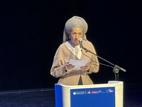Worshipping in person is happening again at First United Methodist Church in Denton, after a 400-day pause because of COVID-19.
The Rev. Don Lee seemed about to levitate as he greeted a long line of the faithful after the June 6 reopening service.
“You are so beautiful!”, he called out with emotion.
But glad as he is to be reunited, the senior pastor does not long for pre-pandemic normality at First Denton.
Lee and the Rev. Jonathan Perry, executive pastor of strategic leadership, intend to build on their church’s success in reaching people online and through local TV broadcasts of services. They are looking at shaking up the worship service schedule, refocusing programs and outreach, and making certain church spaces are more user friendly.
“We have an opportunity, a rare opportunity, to relaunch our church”, Lee said.
Thousands of United Methodist churches in the U.S. are coming out from under pandemic restrictions, and amid the happy reunions, they are assessing what they have been through and what comes next.
Church leadership experts have become preachers in this moment, imploring clergy and lay leaders not to miss an opportunity for change.
“We’re at a crossroads,” said Tim Snyder, senior researcher at the Lewis Center for Church Leadership and visiting assistant professor of practical theology at Wesley Theological Seminary. “Will we go back to those ways of being the church that have been in steady decline for several decades now, or will we risk the possibility that the Spirit of God is once again about to make all things new?”
Thom Rainer, who leads the Church Answers consulting group, recently did a webinar on the post-pandemic church for the Texas Conference. He predicted that the pandemic will hasten membership and attendance declines already long seen by denominations.
But Rainer also sees opportunity.
“There’s more openness to change than there was”, he said by phone. “It’s a window that will close.”
Even pastors whose churches are accustomed to growth agree that the pandemic ignited innovation that needs to continue.
“I like to say we’ve been in a COVID-forced reformation”, said the Rev. Duane Anders, pastor of the Cathedral of the Rockies / First United Methodist Church, in Boise, Idaho.
Anders has lately taught new member classes where a third of the people have never experienced the church other than online.
“I’ve got a whole crowd of people saying, ‘We love our church. Someday we’d love to see the building’”, he said.
In much of the world, the pandemic continues to be a major threat, and even in parts of the U.S., restrictions have only recently been lifted, with some churches still planning their reopening.
A full statistical picture of the pandemic’s effects on The United Methodist Church will be a long time coming, but indications are emerging.
The Great Plains Conference, for example, recently reported that worship attendance was down almost 56% in 2020, even including online participation. Professions of faith plummeted, as did participation in mission work.
United Methodist Communications has done four surveys of pastors since the pandemic’s outset. A report on the last one - done in May and early June - will be posted at ResourceUMC in the coming weeks.
Preliminary results show most churches are holding their own financially, thanks in part to the Paycheck Protection Program. The survey reflects concern about when or if in-person attendance will return to what it was before COVID-19.
That is certainly felt by Margie Briggs, a lay minister whose experience leading two rural Missouri Conference churches is captured in her memoir, “Can You Just Get Them Through Until Christmas?”
“Going to church is a habit”, Briggs said by phone. “It’s a good habit, but once you’re out of the habit, it’s hard to get back into it.”
One of her churches is seeing about 60 percent of its pre-pandemic attendance, and the other is at about 50 percent.
Such percentages appear to be common. Still, a large majority of pastors responding to the UMCom survey feel hopeful.
Many spoke of silver linings they found in the pandemic, including overcoming fears of using technology, experiencing greater teamwork among staff and having the chance to reevaluate ministry efforts.
“It has allowed some things to go away that would have never gone away had the pandemic not occurred”, said the Rev. Rodney Smothers, director of leadership development for the Baltimore-Washington Conference and pastor of Grace United Methodist Church in Fort Washington, Maryland.
Smothers wrote the foreword to “Being the Church in a Post-Pandemic World”, a new book by Kay Kotan, who served in the cabinets of two annual conferences and now consults with churches and conferences.
She is among the experts conferences are putting forward through webinars and other venues to help churches in this stretch, and she is among those saying churches must seize the day.
“Rather than just reopen doors, this is an opportunity to relaunch the church into the community”, she said. “If I were to wave a magic wand, I would love to see all of us be trained as church planters and to have that planter’s mindset.”
The Rev. Clayton Smith, former executive pastor of stewardship and generosity for the United Methodist Church of the Resurrection, in Leawood, Kansas, is another who has being called on for conference webinars. He co-wrote a book called “Growing Through Disaster”, that came out just before the pandemic.
The book is aimed at faith communities that have endured natural disasters, but Smith said the pandemic represents just as severe a test.
“Now is the time for all churches to think about a recovery plan and survey the needs of their people”, he said. “It needs to be based not so much on the church as on the needs of the people the church is serving - a mission focus.”
The Texas Methodist Foundation makes loans to churches, but in recent years has also provided church leadership training. Getting church leaders to do serious discernment, to determine what God is calling them to do and to be willing to get out of their routines - that is a big part of the foundation’s work.
COVID-19 has to some degree forced both discernment and action by churches, suggests Tom Locke, foundation president.
“One of the effects of the pandemic is that it has accelerated change”, he said.
The Rev. Lisa Greenwood, the Texas Methodist Foundation’s vice president for leadership ministry, said the change has to go beyond the superficial.
“I hope churches are asking deep questions about discipleship and formation, and how individuals are being formed and shaped, particularly in the online space”, she said.
At Desert Spring United Methodist Church in Las Vegas, the Rev. David Devereaux recently preached a four-part sermon series on “post-pandemic priorities.”
A few months back, he and his team made the hard decision to close the church’s second campus. Money saved will go toward further bolstering the church’s online presence.
Desert Spring also plans to expand its community resource center, having seen food insecurity and other challenges heightened during the pandemic.
“That’s a leading edge for us going forward”, Devereaux said.
At First United Methodist Church in Miami, the Rev. Audrey Warren has long advocated for risk-taking by church leaders. She is the co-author (with Bishop Ken Carter) of “Fresh Expressions of People Over Property”, which challenges churches to consider re-utilizing their building space.
Before the pandemic, First Miami’s small groups met in person. Now they’re all on Zoom, and that will continue.
“Miami’s a big city, and it’s hard to get to meetings at night”, Warren said. “We’ve had better attendance than ever, even now that things are opening up.”
Back at First Denton, momentum is building for an Aug. 15 service that will mark a full return to in-person activities as well as changes in the worship schedule and other aspects of church life.
“A new normal” is how Don Lee, the senior pastor, describes where the church is headed.
But any future service will have a hard time topping the June 6 reopening. Carol Rogers, chair of the staff parish relations committee, was there early.
“As the sanctuary started to fill”, she said, “I wanted to do a happy dance.”
Originally from: United Methodist News Service
CCD reprinted with permission












